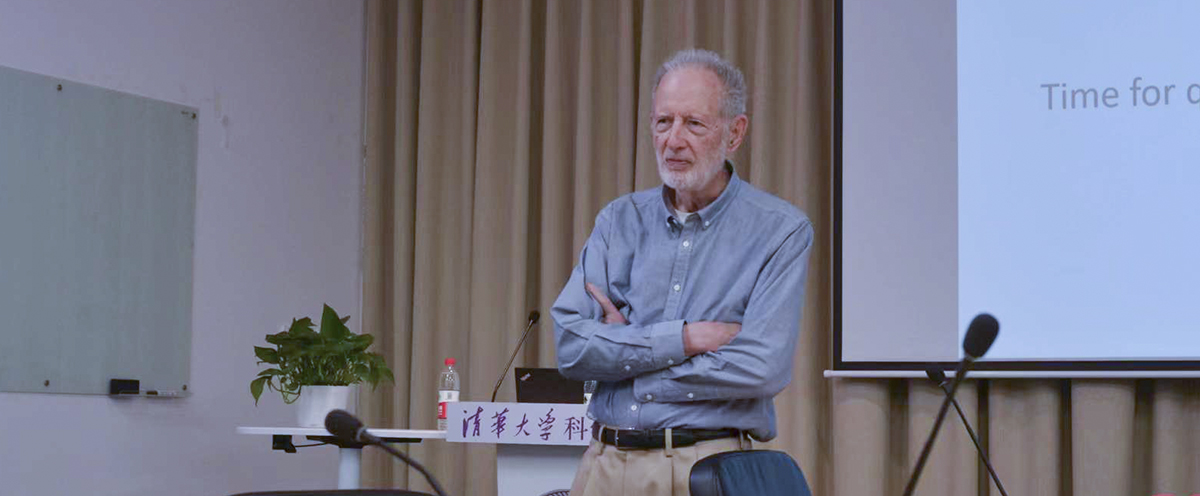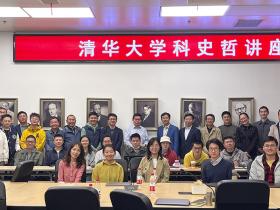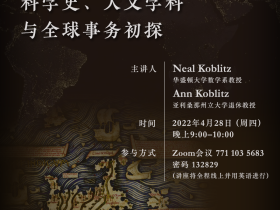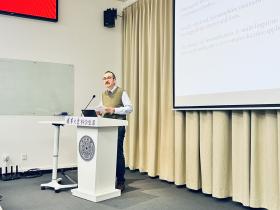On the afternoon of May 5, 2023, the Department of the History of Science at Tsinghua University held the 54th Tsinghua Lecture on the History of Science, Philosophy, and Technology. The lecture, titled “From Theological-Political to Technological-Political Problems”, was delivered by Professor Carl Mitcham, a renowned American philosopher of technology, emeritus professor at Colorado School of Mines, and visiting professor at Renmin University of China.

Professor Mitcham began his lecture by discussing Leo Strauss (1899-1973) and his theological-political problem. Strauss argued that political philosophy is the first philosophy, particularly in Germany, where political existence is a necessary precondition for any other form of existence. The events that occurred to Jews in Germany during World War II demonstrated that both religion and politics cannot operate solely within the realm of reason.
Professor Mitcham then introduced two tentative answers to how religion and politics operate. The first was Franz Rosenzweig’s (1886-1929) analysis of Zionism, which traced back to Spinoza's Tractatus Theologico-Politicus and its critique of Christianity, Judaism, and Islam. Rosenzweig sought to use reason to reconstruct a religiousized politics. The second was the perspective of Karl Schmitt (1888-1985), often regarded as a Nazi philosopher. Schmitt believed that the problem of creating modern Germany lay in defining an “enemy”. It was within this context that Strauss began his exploration of the theological-political problem between 1925 and 1928.
Next, Professor Mitcham addressed modern critiques of religion and Strauss’s analysis of their failures. Philosophers, from Machiavelli to Hobbes and Spinoza, sought to weaken belief in supernatural revelation to curb the political violence incited by Abrahamic religions like Christianity. However, these critiques failed to refute the possibility of revelation. The envisioned liberal state did not take root in Germany but instead gave rise to nihilism.
Finally, Professor Mitcham pointed out that modern states have sought to replace theology with technology (including science, technology, and engineering) and have shifted from the theological-political problem to the technological-political problem. Strauss hinted at this potential alternative in his comments on Karl Schmitt. Professor Mitcham argued that philosophical reflection on technology is necessary to deepen our understanding of the political institutions of our engineered world.
At the end of the lecture, faculty and students engaged in a question-and-answer session with Professor Mitcham. For instance, Assistant Professor Ai Bo asked whether there is only one Jerusalem in the hearts of Jews. Professor Mitcham responded that while some Jews may view Jerusalem as plural, in political terms, it can only be singular. Associate Professor Hu Yilin raised the point that technology has always played a significant role in politics, citing the example of hoplites in ancient Greece and their impact on democracy. He also questioned why the triadic structure of theology-technology-politics could not replace the dualistic structures discussed. Professor Mitcham replied that modern technology indeed has a greater influence and potential for severe consequences. For example, modern technology can manipulate nature on an unprecedented scale and at an atomic level, capable of altering or even destroying the world. A Ph.D. student, Xu Jun, asked whether religious believers such as Christians or Muslims would agree with the lecturer’s perspective. Professor Mitcham responded that practicing religious believers would likely agree because philosophy and revelation are difficult to reconcile. He emphasized that the relationship remains one of duality—philosophical-political and theological-political——capable of intersecting and influencing each other.
Finally, Professor Guosheng Wu asked whether the shift from the theological-political problem rooted in the Greco-Hebrew tradition to a technology-centered problem in modernity could be explained from the lectur’'s perspective. Professor Mitcham replied that Western history has experienced multiple ruptures, and one defining trait of modern thought since Machiavelli has been its rebelliousness against tradition. Modernization, he argued, is a series of rebellions accompanied by a deep dissatisfaction with the human condition, from which modern technology emerges. However, these ruptures themselves are difficult to fully explain.
The lecture concluded with further questions and discussions from other faculty and students.
Author: Shi Yanfei
Reviewer: Guosheng Wu





